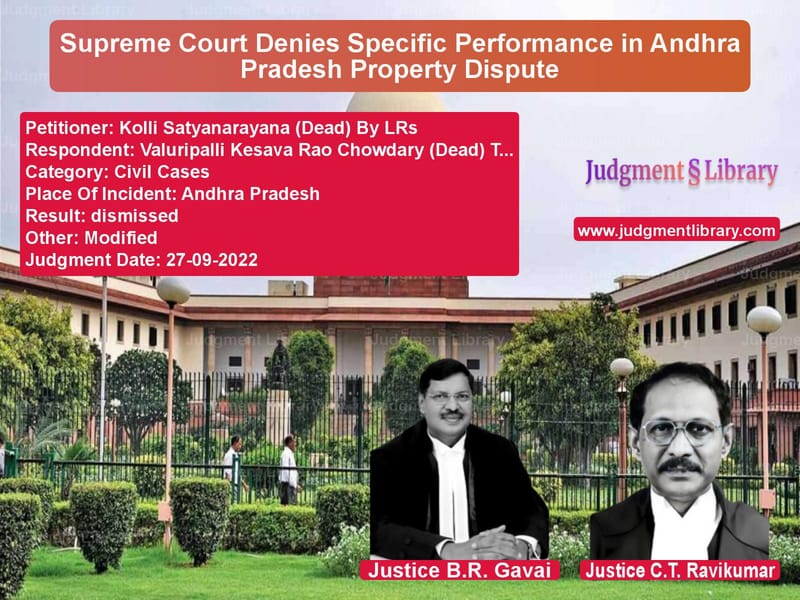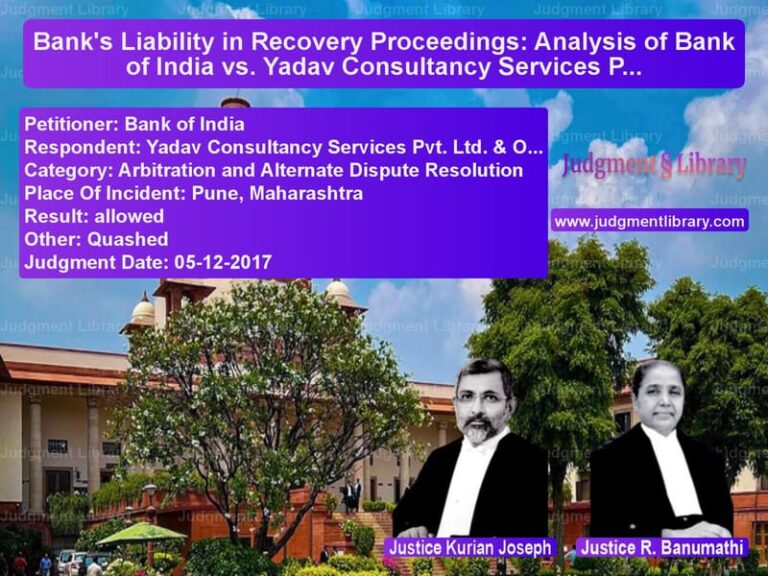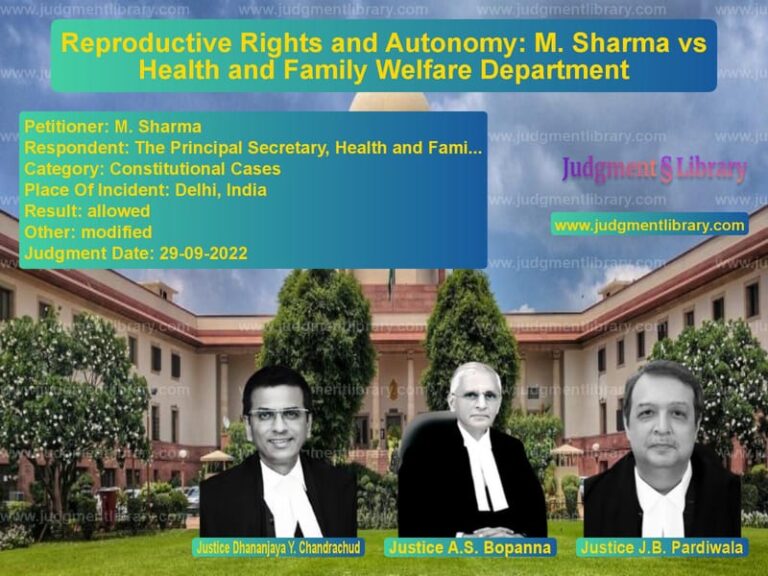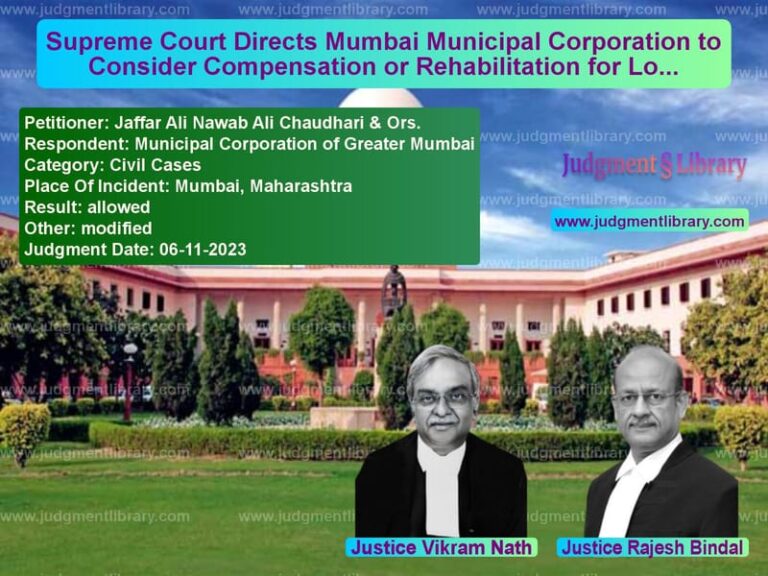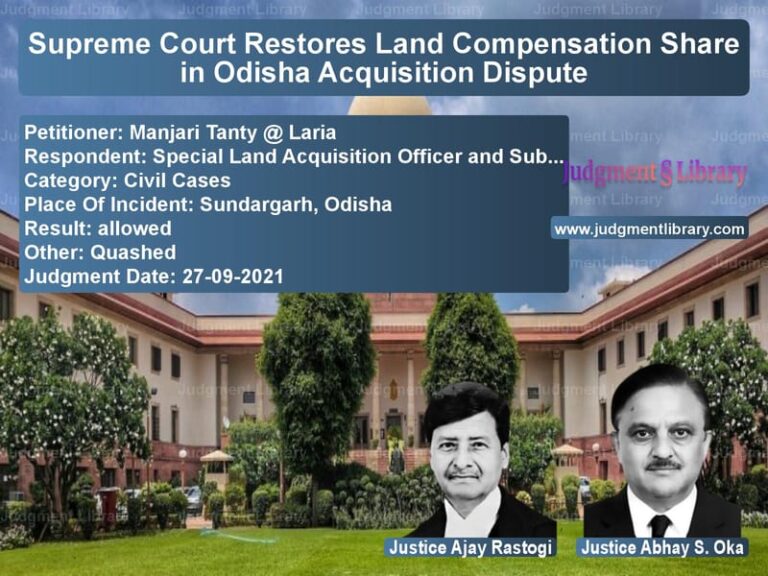Supreme Court Denies Specific Performance in Andhra Pradesh Property Dispute
The Supreme Court of India recently delivered its judgment in the case of Kolli Satyanarayana (Dead) By LRs vs. Valuripalli Kesava Rao Chowdary (Dead) Thr. LRs & Others, rejecting the claim for specific performance in a long-standing property dispute. The case centered around an agreement of sale executed in 1978, which was later canceled due to non-compliance with statutory permissions under the Urban Land (Ceiling and Regulation) Act, 1976 (ULC Act). The Court upheld the decision of the Andhra Pradesh High Court, ruling that the buyer was not entitled to specific performance but increased the refund amount to Rs. 15 lakhs.
Background of the Case
The dispute began when the defendant, owner of the suit property, entered into an agreement of sale with the plaintiff on July 29, 1978. The total sale consideration was fixed at Rs. 45,315, with an advance payment of Rs. 15,000 made through a demand draft dated July 7, 1978.
The defendant later communicated that she was ready to execute the sale deed and planned to travel to Hyderabad for this purpose. However, the plaintiff raised concerns about whether the necessary permission under the ULC Act had been obtained. The agreement required the seller to obtain such permission before the sale could be completed.
Read also: https://judgmentlibrary.com/supreme-court-rules-on-anchorage-and-port-dues-in-mumbai-port-dispute/
Key Developments in the Case
- On October 23, 1978, the plaintiff purchased stamp papers in anticipation of executing the sale deed.
- The defendant applied for exemption under Section 20 of the ULC Act on December 8, 1978.
- On April 12, 1982, the defendant informed the plaintiff that the permission could not be obtained and canceled the agreement, offering a refund of Rs. 15,000.
- The plaintiff refused the refund and insisted that the contract was binding.
- On February 7, 1984, the Andhra Pradesh Government granted exemption under the ULC Act.
- On February 19, 1984, the plaintiff issued a legal notice demanding execution of the sale deed.
- When the defendant refused, the plaintiff filed a suit for specific performance in OS No. 139 of 1984.
Legal Proceedings
Trial Court Decision
- The trial court decreed in favor of the plaintiff, directing the defendant to execute the sale deed within two months.
Andhra Pradesh High Court Decision
- The defendant appealed to the High Court, which overturned the trial court’s ruling.
- The Single Judge of the High Court ruled that the agreement clearly stated that if the seller failed to obtain ULC permission within 75 days, the plaintiff was entitled only to a refund of the advance.
- The Division Bench upheld this decision but granted the plaintiff a refund of Rs. 3 lakhs instead of Rs. 15,000.
Arguments Before the Supreme Court
Arguments by the Plaintiff
- The plaintiff argued that the defendant had no right to cancel the agreement, especially after the ULC permission was eventually obtained.
- The plaintiff was always ready and willing to perform his obligations and should not suffer due to administrative delays.
- The decision to deny specific performance was arbitrary and went against contractual obligations.
Arguments by the Defendant
- The defendant contended that the contract clearly specified a time limit for obtaining ULC permission.
- Since the permission was not obtained within 75 days, the plaintiff was entitled only to a refund.
- The plaintiff took no action for nearly two years after the agreement was canceled.
- The suit was motivated by the increase in land prices rather than a genuine contractual grievance.
Supreme Court’s Observations
The Supreme Court bench, comprising Justice B.R. Gavai and Justice C.T. Ravikumar, examined the evidence and the contractual terms before arriving at the following conclusions:
1. Time Limit for ULC Permission Was Essential
The Court observed that Clause 5 of the agreement explicitly stated that the seller had 75 days to obtain ULC permission, failing which the buyer was entitled only to a refund. The Court ruled that:
“When a contract specifies a time limit for obtaining statutory clearances, it must be given due weight. The plaintiff had a remedy to seek specific performance earlier, but he failed to do so.”
2. Conduct of the Plaintiff Did Not Support Specific Performance
The Court noted that the plaintiff waited for nearly two years after the agreement was canceled before filing a suit. It stated:
“Specific performance is an equitable relief and cannot be granted when the conduct of the plaintiff indicates delay and lack of urgency.”
3. Increasing Land Prices Cannot Justify Specific Performance
The Court found that the plaintiff’s sudden demand for execution of the sale deed only after land prices appreciated significantly was indicative of commercial opportunism rather than genuine intent.
4. Refund Amount Enhanced
While rejecting specific performance, the Supreme Court acknowledged that the plaintiff had paid Rs. 15,000 in 1978, which held much greater value in today’s terms. The Court modified the High Court’s ruling by increasing the refund amount to Rs. 15 lakhs, stating:
“Considering the passage of time and changes in property values, justice demands an equitable relief to the plaintiff.”
Final Verdict
The Supreme Court ruled as follows:
- The plaintiff’s claim for specific performance was dismissed.
- The refund amount was increased to Rs. 15,00,000, payable within three months.
- The judgment of the Andhra Pradesh High Court was upheld with modifications.
Impact of the Judgment
This judgment has important implications for real estate transactions and contract law:
- It reinforces that contractual time limits for statutory approvals must be honored.
- It sets a precedent that specific performance will not be granted if the plaintiff delays legal action.
- It highlights that courts can adjust compensation amounts to ensure fair treatment based on inflation and changes in land value.
Conclusion
The Supreme Court’s ruling in Kolli Satyanarayana vs. Valuripalli Kesava Rao Chowdary upholds the principle that contract enforcement must be balanced with fairness. While denying specific performance, the Court ensured that the plaintiff was compensated fairly for the money paid decades ago. This decision will serve as an important reference in future cases involving real estate agreements and time-sensitive statutory approvals.
Petitioner Name: Kolli Satyanarayana (Dead) By LRs.Respondent Name: Valuripalli Kesava Rao Chowdary (Dead) Thr. LRs & Others.Judgment By: Justice B.R. Gavai, Justice C.T. Ravikumar.Place Of Incident: Andhra Pradesh.Judgment Date: 27-09-2022.
Don’t miss out on the full details! Download the complete judgment in PDF format below and gain valuable insights instantly!
Download Judgment: kolli-satyanarayana-vs-valuripalli-kesava-r-supreme-court-of-india-judgment-dated-27-09-2022.pdf
Directly Download Judgment: Directly download this Judgment
See all petitions in Property Disputes
See all petitions in Contract Disputes
See all petitions in Damages and Compensation
See all petitions in Judgment by B R Gavai
See all petitions in Judgment by C.T. Ravikumar
See all petitions in dismissed
See all petitions in Modified
See all petitions in supreme court of India judgments September 2022
See all petitions in 2022 judgments
See all posts in Civil Cases Category
See all allowed petitions in Civil Cases Category
See all Dismissed petitions in Civil Cases Category
See all partially allowed petitions in Civil Cases Category

